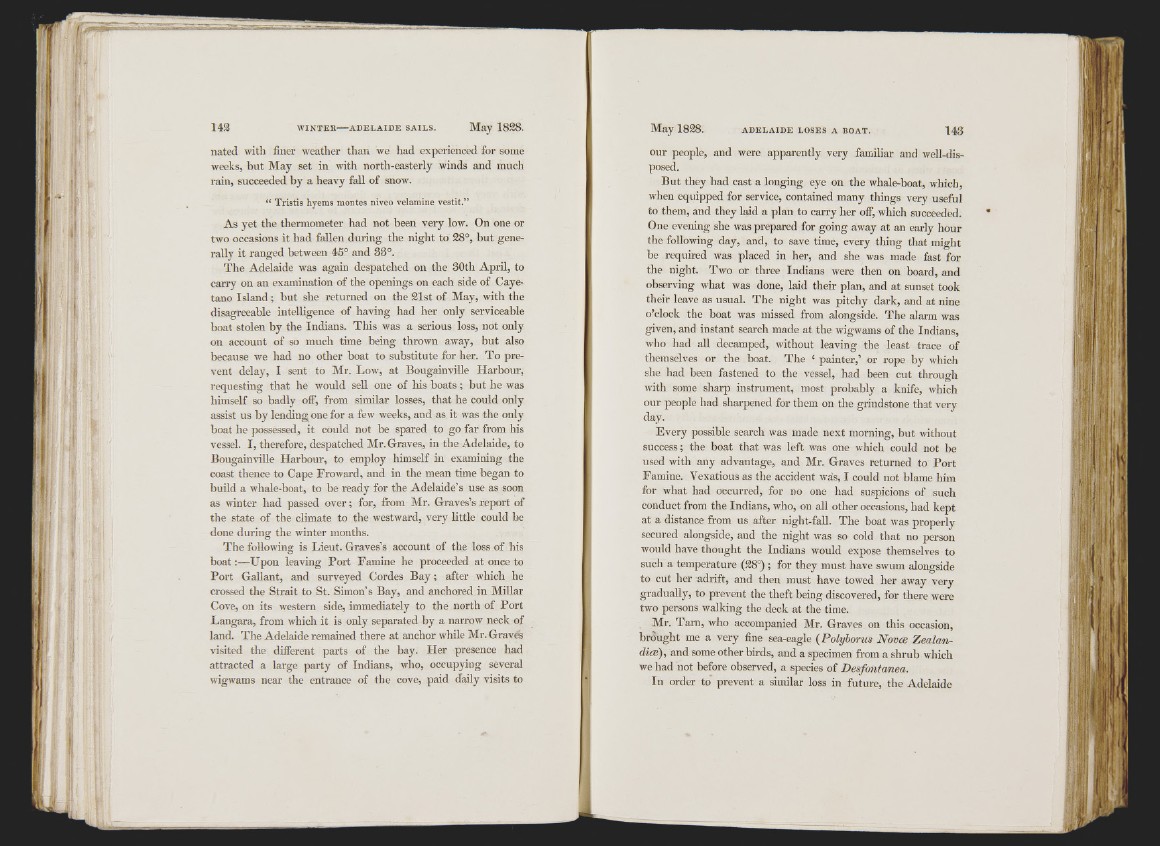
s
I
143 W IN T E R A D E L A ID E SAILS . May 1828.
nated with finer weather than we had experienced for some
weeks, but May set in with north-easterly winds and much
rain, succeeded by a heavy fall of snow.
“ T ristis hyems montes niveo velamine vestit.”
As yet the thermometer had not been very low. On one or
two occasions it had fallen during the night to 28°, but generally
it ranged between 45° and 38°.
The Adelaide was again despatched on the 30th April, to
carry on an examination of the openings on each side of Cayetano
Island ; but she returned on the 21st of May, with the
disagreeable intelligence of having had her only serviceable
boat stolen by the Indians. This was a serious loss, not only
on account of so much time being thrown away, but also
because we had no other boat to substitute for her. To prevent
delay, I sent to Mr. Low, at Bougainville Harbour,
requesting that he would sell one of his boats ; but he was
himself so badly off, from similar losses, that he could only
assist us by lending one for a few weeks, and as it was the only
boat he possessed, it could not be spared to go far from his
vessel. I, therefore, despatched Mr. Graves, in the Adelaide, to
Bougainville Harbour, to employ himself in examining the
coast thence to Cape Froward, and in the mean time began to
build a whale-boat, to he ready for the Adelaide’s use as soon
as winter had passed over ; for, from Mr. Graves’s report of
the state of the climate to the westward, very little could be
done during the winter months.
The following is Lieut. Graves’s account of the loss of his
boat :—Upon leaving Port Famine he proceeded at once to
Port Gallant, and surveyed Cordes Bay; after which he
crossed the Strait to St. Simon’s Bay, and anchored in Millar
Cove, on its western side, immediately to the north of Port
Langara, from which it is only separated by a narrow neck of
land. The Adelaide remained there at anchor while Mr. Gravés
visited the different parts of the bay. Her presence had
attracted a large party of Indians, who, occupying several
wigwams near the entrance of the cove, paid daily visits to
our people, and were apparently very familiar and well-disposed.
But they had cast a longing eye on the whale-boat, which,
when equipped for service, contained many things very useful
to them, and they laid a plan to carry her off, which succeeded.
One evening she was prepared for going away at an early hour
the following day, and, to save time, every thing that might
be required was placed in her, and she was made fast for
the night. Two or three Indians were then on board, and
observing what was done, laid their plan, and at sunset took
their leave as usual. The night was pitchy dark, and at nine
o’clock the boat was missed from alongside. The alarm was
given, and instant search made at the wigwams of the Indians,
who had all decamped, without leaving the least trace of
themselves or the boat. The ‘ painter,’ or rope by which
she had been fastened to the vessel, had been cut through
with some sharp instrument, most probably a knife, which
our people had sharpened for them on the grindstone that very
day.
Every possible search was made next morning, but without
success; the boat that was left was one which could not be
used with any advantage, and Mr. Graves returned to Port
Famine. Vexatious as the accident was, I could not blame him
for what had occurred, for no one had suspicions of such
conduct from the Indians, who, on all other occasions, had kept
at a distance from us after night-fall. The boat was properly
secured alongside, and the night was so cold that no person
would have thought the Indians would expose themselves to
such a temperature (28°) ; for they must have swum alongside
to cut her adrift, and then must have towed her away very
gradually, to prevent the theft being discovered, for there were
two persons walking the deck at the time.
Mr. Tarn, who accompanied Mr. Graves on this occasion,
brought me a very fine sea-eagle {Polyhorus Novce Zealan-
diai), and some other birds, and a specimen from a shrub which
we had not before observed, a species of Desfontanea.
In order to prevent a similar loss in future, the Adelaide